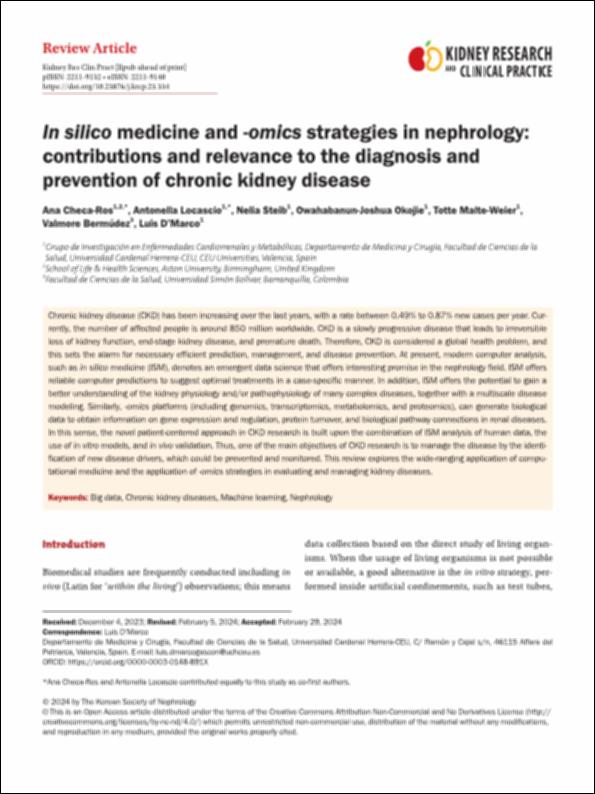Por favor, use este identificador para citar o enlazar este ítem:
http://hdl.handle.net/10637/16184"In silico" medicine and "-omics" strategies in nephrology: contributions and relevance to the diagnosis and prevention of Chronic Kidney Disease
| Título : | "In silico" medicine and "-omics" strategies in nephrology: contributions and relevance to the diagnosis and prevention of Chronic Kidney Disease |
| Autor : | Checa Ros, Ana Locascio, Antonella Steib, Nelia Okojie, Owahabanum-Joshua Malte-Weiver, Totte Bermúdez, Valmore D'Marco Gascón, Luis Gerardo |
| Materias: | Aparato urinario; Urinary system; Enfermedad; Diseases; Nefrología; Nephrology; Medicina preventiva; Preventive medicine; Big data |
| Editorial : | The Korean Society of Nephrology |
| Citación : | Checa-Ros, A., Locascio, A., Steib, N., Okojie, O.J., Malte-Weier, T., Bermúdez, V. & D'Marco, L. (2024). In silico medicine and -omics strategies in nephrology: contributions and relevance to the diagnosis and prevention of Chronic Kidney Disease. Kidney Research and Clinical Practice, Advance online publication. DOI: https://doi.org/10.23876/j.krcp.23.334 |
| Resumen : | Chronic kidney disease (CKD) has been increasing over the last years, with a rate between 0.49% to 0.87% new cases per year. Currently, the number of affected people is around 850 million worldwide. CKD is a slowly progressive disease that leads to irreversible loss of kidney function, end-stage kidney disease, and premature death. Therefore, CKD is considered a global health problem, and this sets the alarm for necessary efficient prediction, management, and disease prevention. At present, modern computer analysis, such as in silico medicine (ISM), denotes an emergent data science that offers interesting promise in the nephrology field. ISM offers reliable computer predictions to suggest optimal treatments in a case-specific manner. In addition, ISM offers the potential to gain a better understanding of the kidney physiology and/or pathophysiology of many complex diseases, together with a multiscale disease modeling. Similarly, -omics platforms (including genomics, transcriptomics, metabolomics, and proteomics), can generate biological data to obtain information on gene expression and regulation, protein turnover, and biological pathway connections in renal diseases. In this sense, the novel patient-centered approach in CKD research is built upon the combination of ISM analysis of human data, the use of in vitro models, and in vivo validation. Thus, one of the main objectives of CKD research is to manage the disease by the identification of new disease drivers, which could be prevented and monitored. This review explores the wide-ranging application of computational medicine and the application of -omics strategies in evaluating and managing kidney diseases. |
| URI : | http://hdl.handle.net/10637/16184 |
| Derechos: | http://creativecommons.org/licenses/by-nc-nd/4.0/deed.es Open Access |
| ISSN : | 2211-9132 2211-9140 (Electrónico) |
| Fecha de publicación : | 5-jul-2024 |
| Centro : | Universidad Cardenal Herrera-CEU |
| Aparece en las colecciones: | Dpto. Medicina y Cirugía |
Los ítems de DSpace están protegidos por copyright, con todos los derechos reservados, a menos que se indique lo contrario.


